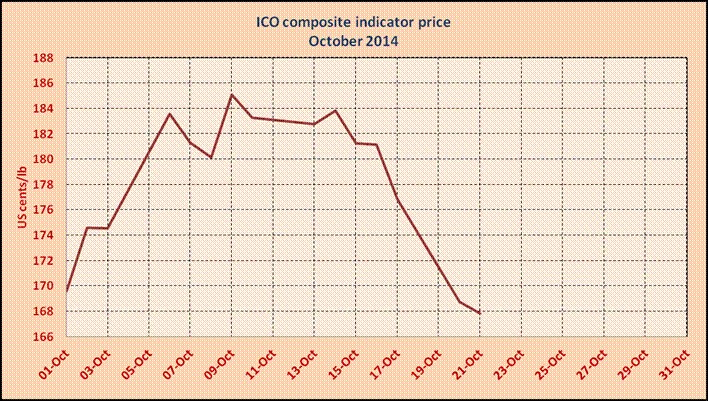Coffee trees suffer irreparable damage during the Brazilian drought, with commodity brokers doubting a recovery in 2015.
As the world's most prolific Coffee (MILAN:COFF) grower, Brazil is an integral component of the commodities market. Approximately 35% of global coffee production and an estimated 50% of the world’s Arabica coffee bean crop comes from Brazil. Some commodities brokers have even likened Brazil's dominance in the coffee market to Saudi Arabia's dominance in the oil market. Unfortunately, coffee is one of those crops that are heavily dependent on weather phenomena and climate change. 2014 has been particularly harsh on the coffee crops in Brazil, owing to a severe and protracted drought which has left many crops destroyed.
When the supply of coffee is reduced, global demand cannot be met and prices rise. This is precisely what is happening with Brazilian coffee right now. The regions which have been hardest hit by the prolonged drought include Cerrado, Mogiana and Sul Minas, resulting in the flowering period being delayed. This typically takes place between the months of October and November. This has a knock-on effect on next year's crops, since the absence of flowers automatically translates into the absence of coffee cherries. The numbers speak volumes: 2014 production will be reduced to 48 million x 60 kg bags – down 13% from 2013.
Price Shocks Hit Customers in their Pockets.Coffee charts from 2009 – 2014 reflect seesawing production levels. Brazilian coffee production increased between 2009 and 2010, and decreased between 2010 and 2011. Production increased between 2011 and 2012 and has been on the decline ever since. As a result in the sharply reduced supply of Brazilian coffee, prices are now at multi-year highs with the benchmark index – ICE March – trading as high as $2.29 per pound. While this figure may not resonate with everyday coffee drinkers, the effects of decreased coffee supply are clearly felt at Folgers and Starbucks where prices rose 9% and 8% respectively.
If the Brazilian drought continues, analysts expect Brazilian coffee exports to drop below 40 million x 60 kg bags in 2015. In the event that this happens, the price could soar to as high as $3 per pound of coffee beans. Price falls for Arabica coffee futures dropped to 199.40 cents in NYC for December delivery. That marks a 5.3 percentage point decline. Robusta coffee for delivery in January dropped to $2060 per tonne in London, a 3.2 percentage point decline. It is expected that at least 2 1/2 inches of rain could fall across large parts of Brazil in November. Even with all this projected rain, there has been significant damage to coffee crops and prospects for next year's production are grim. Banc De Binary commodities experts caution that it may be too late to stave off a coffee price increase, owing to a sharp reduction in supply. On a positive note, rain will definitely assist in crop stabilisation, which will calm global fears about coffee price shocks.
Global Demand for Coffee Steadily IncreasingDemand for coffee is constantly on the rise. One of the fastest-growing coffee consuming countries is China with an annual growth rate hovering around 13%. Japan is another international market which is showing strong demand for coffee. It now ranks third behind the US and Germany as the biggest consumer of this commodity. During 2013 Japan's coffee consumption topped 446K tons. The biggest driver of coffee demand in Japan has been the changing habits of coffee drinkers, who now perceive it as an anytime beverage, rather than a social drink to be consumed at coffee shops, delis and restaurants. What is true about global coffee demand is that it is always on the increase, and people are price insensitive as they need their daily fix of caffeine.
Daily Prices of Coffee with the International Coffee Organization (ICO) Daily Calendar
On 1 October, the ICO composite indicator was 169.63 US cents per pound (high of 185.09 and a low of 167.86). Colombian Milds group indicator was 217.96 (high of 239.36 and a low of 215.64), Other Milds group indicator was 220.92 (high of 241.77 and a low of 219.57), Brazilian Naturals group indicator was 193.00 (high of 213.48 and a low of 190.18), and Robustas group indicator was 103.24 (high of 109.31 and a low of 102.23). The following image represents the ICO composite indicator price for October 2014:
Image and data supplied by International Coffee Organization (ICO)
How Speculators are Benefiting from Rising Coffee Prices
Owing to the fact that a large part of the coffee season has been lost to drought, speculators have been driving the price higher, in expectation of a shortage. Traders will continue to push the price of coffee higher, even as global markets reel from a recession in Japan, poor performance in Europe and a shock reversal price correction on Wall Street. In the first week of October, the price of coffee hit a 2-year high of $2.21 per pound with Arabica beans. Speculators cashed in big time with this commodity, given the fact that precisely a year ago the price of Arabica beans was barely $1 per pound.
Everyday consumers needn't worry about price rises at their local supermarkets, since the lag effect will take between 9 and 12 months for price increases to be passed on to consumers. The price increases are being fuelled by speculator activity vis-a-vis the ongoing drought and next year's crop production. One of the ways that speculators are profiting from rising coffee prices is exchange traded funds. These ETFs are high risk investments, and they use borrowed money to magnify the yield. Annual costs for coffee exchange traded funds can range from 0.49% to 0.75%. They are not advised for novice traders, and if you do dabble in ETFs, these investments should constitute a small percentage of your financial portfolio.
